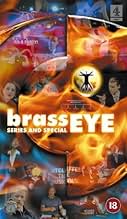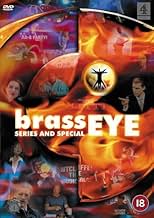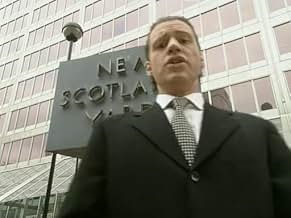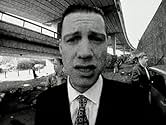IMDb-BEWERTUNG
8,6/10
12.323
IHRE BEWERTUNG
Kontroverse Parodie auf das Zeitgeschehen im Fernsehen und die Rolle der Berühmtheit im Vereinigten Königreich.Kontroverse Parodie auf das Zeitgeschehen im Fernsehen und die Rolle der Berühmtheit im Vereinigten Königreich.Kontroverse Parodie auf das Zeitgeschehen im Fernsehen und die Rolle der Berühmtheit im Vereinigten Königreich.
- Nominiert für 2 BAFTA Awards
- 3 Nominierungen insgesamt
Folgen durchsuchen
Zusammenfassung
Reviewers say 'Brass Eye' is a groundbreaking media satire that critiques sensationalism and media intelligence. It is noted for its uncomfortable, angry tone and clever use of graphics and music. The series lampoons trash media sensationalism on various subjects, trapping celebrities and politicians. It is considered a powerful assault on 90's media, remaining relevant and often compared to 'The Day Today'. Its subversive nature, controversial content, and ability to provoke thought make it a must-watch for fans of dark, satirical humor.
Empfohlene Bewertungen
I've just become a fan of Brass Eye after seeing the DVD at a friends house, I have to say it is brilliant and there is no doubt in my mind as to why so many people were against the show. Brass eye shows how the media manipulates and exploits situations to tell you the viewer just what to think about everything. It is a satire on Panarama type shows where all the facts are laid out straight for everyone to see, that way everyone can agree that something is wrong, let's say "drugs" for example. The most controversial, maybe the funniest episode is the episode on Paedophelia. If only people realised that not only do the media promote and fuel paedophelia (just look through the papers, counting down the days that Mary Kate and Ashley became legal, Britney Spears first video, definite exploitation of Paedophelia). The media also speaks out against it, in around 2001 they used the subject spread hatred and fear, everyone was a suspected Paedophile. This is where I believe the humour lies in the show, it is not making fun of the serious issues but it is making fun of the way the Media uses these issues and will exploit them to their own advantage. A very clever and a very funny satire.
In these brightly Orwellian days, where cynical governments can smile 'Trust me...' and know we will fill in the blanks 'I'm lying' and not care; where 'biting' satire is left in the sole hands of a cricket-loving impressionist; where the laurel of 'great comedy' is placed on the head of yet another formulaic spoof of fly-in-the-wall documentaries; in these grimly shining times, Chris Morris is a dark beacon of sense, moral fury, fierce intelligence, intransigent vision; a man of endless, astonishing invention, intimidating energy and a gleefully, pranksterish sensibility.
The problem with today's 'satire' is that it sets up an 'us against them' opposition, in which we snicker with the satirist at a host of immovable, indifferent caricatures. Most of our most prominent satirists are of the same generation, background and ideology of the ruling classes, and their humour has the flavour of locker-room ribbing rather than devastating anger. Most satire consists of an audience talking to itself, reassuring itself of its own worth, its own values against targets so clearly ridiculous they don't really exist. It is satire as easy listening, as reassuring as old socks.
The reason many people don't like Chris Morris is not because of the 'taboo' subject matter he tackles, but because he doesn't play fair, he doesn't play cricket. He never allows the audience the comfort of complacent complicity. if we sneer at another hapless celebrity duped into piously anguishing over some preposterous non-issue in an obscene public gesture of their own ethical value and depth, we are stating that we are truly 'authentic', that we would never be caught out, that our values are sound. And then Morris will insert a crass joke that strips away the warm cloak of lazy irony - an imitation of the author of 'A Brief History of Time', for instance - that repels us, shakes us out of a cosy 'us vs them' mentality, forcing us to face up to the complexity of what we're watching, or - shock, horror! - think for ourselves.
When I was watching the 'Brass eye' repeats recently, I was struck by how little they had dated, how exhilirating and intellectually stimulating, as well as cripplingly funny, they still were. Surely a media satire, with its inbuilt topicality, should become instantly anachronistic. You could argue that this is a damning indictment of a media that hasn't changed its mind-numbing habits in the last half-decade. I would argue, however, that 'Brass eye' is not really a media satire at all, or is not one fundamentally, despite its destructively accurate potshots at sensationalism, the paucity of media intelligence, a culture with a media that no longer records or reflects reality, but actually creates it, as in the recent case of a major Sunday newspaper printing photos of paedophiles, encouraging the public to savage them, conveniently creating the next morning's news. This is all an essential part of what 'Brass eye' does.
But it is more than that. Morris is our century's Jonathan Swift, and last week's 'Brass eye special' on media hysteria about paedophilia was his 'A Modest Proposal', a satire so savage, so angry, so uncomfortable, so ironic in the true, original sense of that phrase, that people mistook the satire for its object, because Morris held up a mirror to our society, a totalitarian, propaganda-corrupt culture posing as a democracy; and to ourselves, we who conceal brutal, fascist instincts under a guise of ethical concern. We didn't like it, and rather than acknowledge our own darkness, we tried to smash the mirror. Like Swift, Morris has always been more concerned with language and ontology than the media per se, the way words no longer mean what they are supposed to mean, in the way the advance of media technology has created an illusionistic world in which 'real' people have to live, in which we try to make the illusion real, to devastating results. And yet, again like Irishman, the sheer invention with which Morris records this communicative decadence channelled through language, liberates and gives some hope - but only if we accept the challenge of 'Brass eye'.
The problem with today's 'satire' is that it sets up an 'us against them' opposition, in which we snicker with the satirist at a host of immovable, indifferent caricatures. Most of our most prominent satirists are of the same generation, background and ideology of the ruling classes, and their humour has the flavour of locker-room ribbing rather than devastating anger. Most satire consists of an audience talking to itself, reassuring itself of its own worth, its own values against targets so clearly ridiculous they don't really exist. It is satire as easy listening, as reassuring as old socks.
The reason many people don't like Chris Morris is not because of the 'taboo' subject matter he tackles, but because he doesn't play fair, he doesn't play cricket. He never allows the audience the comfort of complacent complicity. if we sneer at another hapless celebrity duped into piously anguishing over some preposterous non-issue in an obscene public gesture of their own ethical value and depth, we are stating that we are truly 'authentic', that we would never be caught out, that our values are sound. And then Morris will insert a crass joke that strips away the warm cloak of lazy irony - an imitation of the author of 'A Brief History of Time', for instance - that repels us, shakes us out of a cosy 'us vs them' mentality, forcing us to face up to the complexity of what we're watching, or - shock, horror! - think for ourselves.
When I was watching the 'Brass eye' repeats recently, I was struck by how little they had dated, how exhilirating and intellectually stimulating, as well as cripplingly funny, they still were. Surely a media satire, with its inbuilt topicality, should become instantly anachronistic. You could argue that this is a damning indictment of a media that hasn't changed its mind-numbing habits in the last half-decade. I would argue, however, that 'Brass eye' is not really a media satire at all, or is not one fundamentally, despite its destructively accurate potshots at sensationalism, the paucity of media intelligence, a culture with a media that no longer records or reflects reality, but actually creates it, as in the recent case of a major Sunday newspaper printing photos of paedophiles, encouraging the public to savage them, conveniently creating the next morning's news. This is all an essential part of what 'Brass eye' does.
But it is more than that. Morris is our century's Jonathan Swift, and last week's 'Brass eye special' on media hysteria about paedophilia was his 'A Modest Proposal', a satire so savage, so angry, so uncomfortable, so ironic in the true, original sense of that phrase, that people mistook the satire for its object, because Morris held up a mirror to our society, a totalitarian, propaganda-corrupt culture posing as a democracy; and to ourselves, we who conceal brutal, fascist instincts under a guise of ethical concern. We didn't like it, and rather than acknowledge our own darkness, we tried to smash the mirror. Like Swift, Morris has always been more concerned with language and ontology than the media per se, the way words no longer mean what they are supposed to mean, in the way the advance of media technology has created an illusionistic world in which 'real' people have to live, in which we try to make the illusion real, to devastating results. And yet, again like Irishman, the sheer invention with which Morris records this communicative decadence channelled through language, liberates and gives some hope - but only if we accept the challenge of 'Brass eye'.
More Jokes, One Liners, Insanity, Nonsense, Scathing Insight, Mockery, Satire, Offence, and Total Wrongness wrapped up in a Bitesize of 30 minutes than anything that has ever been previously created in the history of time and space.
Pushing the boundaries of Televisual Entertainment above and Beyond anything anyone would ever have expected. They actually had a question raised in Parliament about "Cake"! The endless stream of "Celebs" quoting ridiculous statements about the abuse of "Cake".
Probably my favourite part of this show is the visual graphic and statistics they employ. Wonderful!
Pushing the boundaries of Televisual Entertainment above and Beyond anything anyone would ever have expected. They actually had a question raised in Parliament about "Cake"! The endless stream of "Celebs" quoting ridiculous statements about the abuse of "Cake".
Probably my favourite part of this show is the visual graphic and statistics they employ. Wonderful!
With such modern stuff as Phoenix nights and The Office this is often overlooked nowadays but there's no doubting the power this had when made. Its a lot more controversial, perhaps the most controversial piece of satire seen on British television. Especially the Paedogedden episode which is on the DVD along with the original series. It caused a media uproar when the point was missed entirely, specifically the medias obsession with the topic of paedophilia and a victim obsessed society, True though it isn't the funniest, i would give that to the Drugs and animals episodes though all have a very strong angry message, People like Chris Morris are vital and he deserves praise for the vision and the bravery to make the show. (The celebrities tricked into appearing on the show are also a highlight throughout) The over the top graphics and deadpan style of it also adds to the show greatly.
Absolutely recommended though not for the easily offended or shallow minded.
Absolutely recommended though not for the easily offended or shallow minded.
One of my favourite bits in Brass Eye is during the 'Crime' episode when celebrities record video messages for criminals. They're hosted by Tommy Vance, who spouts hilarious dribble about "foaming nut-brown ale", but the best bit is when he introduces a message intended for murderers "You are a murderer," he says with an attempt at gravity, "and I can only pray to God that you watch and you listen very carefully to this." We then cut to Vanessa Feltz who, with complete sincerity and self-righteous fury, delivers one of the funniest monologues in history - she plays the part of a murdered individual. "Do you even know what a feeling is? I do but I can't have any more because of you. I hate you." Her acting alone is enough to have me cracking up ("Look into my eyes, murderer") but I love the thought that she delivered this message fully believing that it would be shown to convicted criminals. Could you just imagine it? The laughter from the prisons would engulf the British Isles.
But seeing celebrities humiliated is one of the primary joys of Brass Eye. In every episode we're confronted with their stupidity, their need for attention and their unthinking desire to promote 'good' causes. It's amazing that not one of them listens to what they're saying. I mean, whether it's Paul Daniels talking about an elephant having its trunk stuck up its anus, or Noel Edmonds talking about the evils of Cake, or Nick Owen talking about "sodomised electrons"; none of them question the information they're given. And it's not like the practical jokes are subtle. Just take Dr Fox. He spouts the following: "Genetically, paedophiles have more genes in common with crabs than they do with you and me. Now that is scientific fact. There's no real evidence for it, but it is scientific fact." Only a simpleton in desperate need of an ego stroke could say that with a straight face.
Therefore it's nothing but a pleasure to see the celebrities ridiculed. And another marvellous piece is when Richard Blackwood tells us that paedophiles can make keyboards release gasses that make children suggestible. And yet another great moment is when Stephen Berkoff gives us a demonstration of 'heavy electricity'. He really gets into his speech, smashing toy figures. But what I love is that after he bashes a human figurine he charmingly says, "That could be your mother." If I remember right that line was used when the programme was first advertised, and that line delivery was what got me watching the programme in the first place. But the most devious anti-celebrity piece is when a poem by Nicolas Parsons is re-edited in such a way that he says the following: "Aren't we a bunch of f***wits? An elephant could no more get its trunk stuck up its arse than we could lick our balls." Says it all really.
But Brass Eye is a lot more than just a rant against celebrity. It's also a merciless spoof of television news broadcasting. And the accuracy in which the programme apes the news, what with its pointless graphics, dramatic music and sensationalism, is undoubtedly what got it into trouble with the gutter press it was too near the bone. Take the paedophile episode. If you read the Daily Mail you probably think it's 'evil'. But instead it's just showing how the news trivialises important issues for the sake of a few lurid headlines. And it also depicts the media's relentless fear mongering. At one point we're told that a paedophile has been getting away with attacking children by dressing as a school. And there's a hilarious segment about a pervert called Jez North. The skit features a reconstruction Crime Watch would be proud of and then even though the paedophile gets a nonce bashing, and is therefore "quadra-spazzed on a life-glug", we're asked whether we can be sure that "pervert mechanics" can't build him a "rooboplaegic wrong-cock." The news loves fear.
However, as great as the paedophile episode is, 'Sex' probably makes me laugh the most. It opens with lurid music and a couple of naked figures. We then see that it's Christopher Morris taking a woman from behind. For a moment he stops, saying "If this were really happening, what you would think?" but when we cut to the studio, and a now suited Morris starts talking, we can see the other Morris on a television screen resuming his banging with gusto. It's a cheap laugh but they all count.
Another fantastic piece in that episode is during a The Time the Place/Kilroy-style debate. Morris talks to a girl who saw her parents killed by a frozen dog falling on them while they were "making sex". He asks the kid whether it will give her psychosexual problems later in life. It just beautifully captures the heartless way those programmes use their guests.
But the best bit in the episode, and one of the most famous sketches in the series, is the "Good AIDS, Bad AIDS" piece. It starts off with Morris patronising his guest ("Who says AIDS guys can't do tough stuff? This guy's got AIDS and he's about to beat me in an arm wrestling match") and then it ends with him berating the AIDS guy for having 'bad' variety of the syndrome ("What if someone shoots you with a machine gun? Anyone yawning will get your infected blood in their mouth"). Again, it's a perfect copy of those simplistic, moralising, rightwing debate shows that used to infest daytime television.
But I really can't adequately express how great the programme is. And there's so much other funny stuff that I haven't got room to mention the American news pieces are priceless. Foaming nut-brown ale for everyone involved.
But seeing celebrities humiliated is one of the primary joys of Brass Eye. In every episode we're confronted with their stupidity, their need for attention and their unthinking desire to promote 'good' causes. It's amazing that not one of them listens to what they're saying. I mean, whether it's Paul Daniels talking about an elephant having its trunk stuck up its anus, or Noel Edmonds talking about the evils of Cake, or Nick Owen talking about "sodomised electrons"; none of them question the information they're given. And it's not like the practical jokes are subtle. Just take Dr Fox. He spouts the following: "Genetically, paedophiles have more genes in common with crabs than they do with you and me. Now that is scientific fact. There's no real evidence for it, but it is scientific fact." Only a simpleton in desperate need of an ego stroke could say that with a straight face.
Therefore it's nothing but a pleasure to see the celebrities ridiculed. And another marvellous piece is when Richard Blackwood tells us that paedophiles can make keyboards release gasses that make children suggestible. And yet another great moment is when Stephen Berkoff gives us a demonstration of 'heavy electricity'. He really gets into his speech, smashing toy figures. But what I love is that after he bashes a human figurine he charmingly says, "That could be your mother." If I remember right that line was used when the programme was first advertised, and that line delivery was what got me watching the programme in the first place. But the most devious anti-celebrity piece is when a poem by Nicolas Parsons is re-edited in such a way that he says the following: "Aren't we a bunch of f***wits? An elephant could no more get its trunk stuck up its arse than we could lick our balls." Says it all really.
But Brass Eye is a lot more than just a rant against celebrity. It's also a merciless spoof of television news broadcasting. And the accuracy in which the programme apes the news, what with its pointless graphics, dramatic music and sensationalism, is undoubtedly what got it into trouble with the gutter press it was too near the bone. Take the paedophile episode. If you read the Daily Mail you probably think it's 'evil'. But instead it's just showing how the news trivialises important issues for the sake of a few lurid headlines. And it also depicts the media's relentless fear mongering. At one point we're told that a paedophile has been getting away with attacking children by dressing as a school. And there's a hilarious segment about a pervert called Jez North. The skit features a reconstruction Crime Watch would be proud of and then even though the paedophile gets a nonce bashing, and is therefore "quadra-spazzed on a life-glug", we're asked whether we can be sure that "pervert mechanics" can't build him a "rooboplaegic wrong-cock." The news loves fear.
However, as great as the paedophile episode is, 'Sex' probably makes me laugh the most. It opens with lurid music and a couple of naked figures. We then see that it's Christopher Morris taking a woman from behind. For a moment he stops, saying "If this were really happening, what you would think?" but when we cut to the studio, and a now suited Morris starts talking, we can see the other Morris on a television screen resuming his banging with gusto. It's a cheap laugh but they all count.
Another fantastic piece in that episode is during a The Time the Place/Kilroy-style debate. Morris talks to a girl who saw her parents killed by a frozen dog falling on them while they were "making sex". He asks the kid whether it will give her psychosexual problems later in life. It just beautifully captures the heartless way those programmes use their guests.
But the best bit in the episode, and one of the most famous sketches in the series, is the "Good AIDS, Bad AIDS" piece. It starts off with Morris patronising his guest ("Who says AIDS guys can't do tough stuff? This guy's got AIDS and he's about to beat me in an arm wrestling match") and then it ends with him berating the AIDS guy for having 'bad' variety of the syndrome ("What if someone shoots you with a machine gun? Anyone yawning will get your infected blood in their mouth"). Again, it's a perfect copy of those simplistic, moralising, rightwing debate shows that used to infest daytime television.
But I really can't adequately express how great the programme is. And there's so much other funny stuff that I haven't got room to mention the American news pieces are priceless. Foaming nut-brown ale for everyone involved.
Wusstest du schon
- WissenswertesThe Paedogeddon Special is the third most complained-about episode of television ever (first and second are the Jerry Springer Opera and Big Brother 2000).
- Zitate
Christopher Morris: You're wrong, and you're a grotesquely ugly freak!
- Alternative VersionenWhen the show first aired in 1997, some of the more controversial sketches were cut on the orders of the then-head of Channel 4 programming Michael Grade, most notably a piece concerning a musical based on the life of and starring the serial killer Peter Sutcliffe. The edition of the show in which the sketch would have featured was allegedly broadcast containing a onscreen subliminal message lasting 1/25 of a second that read "Grade is a cunt". The series was repeated in 2001 with the Sutcliffe sketch and some other material shown uncut, and with the subliminal message removed.
- VerbindungenFeatured in Storm Over 4 (1998)
Top-Auswahl
Melde dich zum Bewerten an und greife auf die Watchlist für personalisierte Empfehlungen zu.
- How many seasons does Brass Eye have?Powered by Alexa
Details
Zu dieser Seite beitragen
Bearbeitung vorschlagen oder fehlenden Inhalt hinzufügen

































